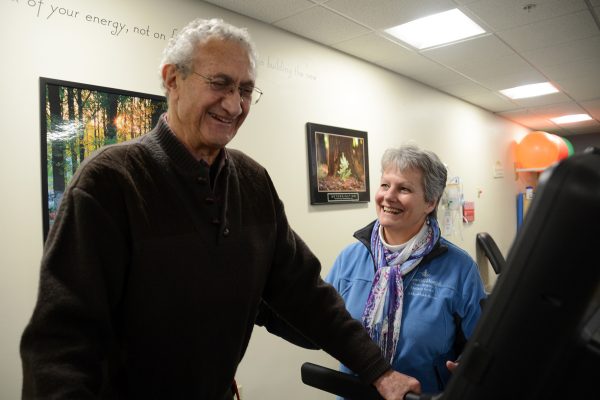Why We Lose Our Motivation To Exercise And How To Get It Back

Michelle Keenan helps motivate Dave Cianciolo
Guest post by By Michelle Keenan, Clinical Coordinator of Heart Health and Wellness Services at Memorial Hospital, Conway, NH.
Ever wonder why you lose motivation when it comes to your exercise program? Why do some of us start and stop exercise programs and nothing seems to stick? Researchers suggest there are two factors associated with lack of motivation to exercise and we know them well.
Not that interested
The first is that some people are just not interested in exercising and have no intention to exercise. They don’t enjoy it and don’t value the health outcomes enough to make it a priority in their lives. Barriers to regular exercise include lack of time, family, work or school obligations.
A bad experience
The second factor is some people may have had a negative experience in the past and don’t have the confidence to be physically active. Some may have physical limitations that prevent exercise from being enjoyable.
These two factors contribute to the current national physical activity data.
What’s recommended
Less than 28% of American, less than 40% of European adults and less than 15% of Canadians adults meet recommended guidelines for physical activity.
The American Heart Association recommends 150 minutes of moderate exercise or general physical activity per week for general health and improved well-being.
Finding motivation
Recent evidence-based research has begun to focus on what is called the Self-Determination Theory to help us better understand what motivates us. They examined exercise behavior and what makes us tick. Their research focused on external and internal motivators.
External motivators are incentives that seek to obtain an outcome that is different from the activity such as weight loss, improved body image, social reward, financial benefit or self-approval.
Exercise trackers are a good example of an external motivator. They were marketed to motivate us to lose weight, exercise more and perhaps even change our eating habits. These motivators proved to be very helpful in developing an exercise plan in the short term.
Internal motivators are incentives that include a specific health outcome, doing exercise for the sheer enjoyment or to just feel better.
These incentives proved to have more long-term success. There is a difference between “having to or suppose to” exercise based on what other people think you should be doing or the latest fitness craze versus “wanting to” exercise for your own personal reasons. As humans, we like both external and internal motivators.
How to succeed
Long-term success will come when we look at our behavior — what we truly like, what are goals are, the lifestyle we want — and begin to transition to more intrinsic motivators. Research has proven that when individual psychological needs are met, there is a greater sense of vitality and well-being. When we align with what is and feels most natural for us, we will have greater success.
Eastern philosophies suggest that exercise is a way to bring the body and its natural constitution back into balance. If you tend to be more of a type A personality (more driven) the recommended exercise would be lower intensity forms of exercise like meditative walking, yoga, T’ai Chi and more rhythmical types of exercise that can produce a more calming effect to the body. In the reverse, if you tend to be more of a Type B personality (more laid back) higher intensity exercise would be more helpful to bring balance back to the body.
Here are a few helpful tips:
- Explore different activities to see what gives you the most enjoyment
- Be honest with yourself and your limitations
- Think about whether you like exercise equipment or prefer exercising outdoor
- If you like to exercise alone or in a group
- If you like a quiet, meditative environment or a more social one
Remember all physical activity is good activity and the best activity is the one you enjoy the most. As I am writing this article, I can’t help but think of my grandmother. Her exercise program was her lifestyle. She walked to do her errands and did all her own housework. There were no fitness centers and she lived to be a happy and healthy 94 years old!
Guest post by By Michele Keenan, Clinical Coordinator of Heart Health and Wellness Services at Memorial Hospital, Conway, NH.
What do you do for exercise? How do you stay motivated?
Story Credit: http://catchinghealth.bangordailynews.com/2017/01/06/blog/why-we-lose-our-motivation-to-exercise-and-how-to-get-it-back/


